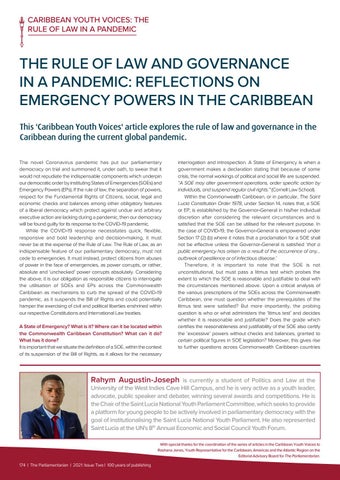CARIBBEAN YOUTH VOICES: THE RULE OF LAW IN A PANDEMIC
THE RULE OF LAW AND GOVERNANCE IN A PANDEMIC: REFLECTIONS ON EMERGENCY POWERS IN THE CARIBBEAN This 'Caribbean Youth Voices' article explores the rule of law and governance in the Caribbean during the current global pandemic. The novel Coronavirus pandemic has put our parliamentary democracy on trial and summoned it, under oath, to swear that it would not repudiate the indispensable components which underpin our democratic order by instituting States of Emergencies (SOEs) and Emergency Powers (EPs). If the rule of law, the separation of powers, respect for the Fundamental Rights of Citizens, social, legal and economic checks and balances among other obligatory features of a liberal democracy which protect against undue and arbitrary executive action are lacking during a pandemic, then our democracy will be found guilty for its response to the COVID-19 pandemic. While the COVID-19 response necessitates quick, flexible, responsive and bold leadership and decision-making, it must never be at the expense of the Rule of Law. The Rule of Law, as an indispensable feature of our parliamentary democracy, must not cede to emergencies. It must instead, protect citizens from abuses of power in the face of emergencies, as power corrupts, or rather, absolute and ‘unchecked’ power corrupts absolutely. Considering the above, it is our obligation as responsible citizens to interrogate the utilisation of SOEs and EPs across the Commonwealth Caribbean as mechanisms to curb the spread of the COVID-19 pandemic, as it suspends the Bill of Rights and could potentially hamper the exercising of civil and political liberties enshrined within our respective Constitutions and International Law treaties. A State of Emergency? What is it? Where can it be located within the Commonwealth Caribbean Constitution? What can it do? What has it done? It is important that we situate the definition of a SOE, within the context of its suspension of the Bill of Rights, as it allows for the necessary
interrogation and introspection. A State of Emergency is when a government makes a declaration stating that because of some crisis, the normal workings of political and social life are suspended. “A SOE may alter government operations, order specific action by individuals, and suspend regular civil rights.” (Cornell Law School). Within the Commonwealth Caribbean, or in particular, The Saint Lucia Constitution Order 1978, under Section 14, notes that, a SOE or EP, is established by the Governor-General in his/her individual discretion after considering the relevant circumstances and is satisfied that the SOE can be utilised for the relevant purpose. In the case of COVID-19, the Governor-General is empowered under Section 17 (2) (b) where it notes that a proclamation for a SOE shall not be effective unless the Governor-General is satisfied ‘that a public emergency has arisen as a result of the occurrence of any... outbreak of pestilence or of infectious disease.’ Therefore, it is important to note that the SOE is not unconstitutional, but must pass a litmus test which probes the extent to which the SOE is reasonable and justifiable to deal with the circumstances mentioned above. Upon a critical analysis of the various prescriptions of the SOEs across the Commonwealth Caribbean, one must question whether the prerequisites of the litmus test were satisfied? But more importantly, the probing question is who or what administers the ‘litmus test’ and decides whether it is reasonable and justifiable? Does the grade which certifies the reasonableness and justifiability of the SOE also certify the ‘excessive’ powers without checks and balances, granted to certain political figures in SOE legislation? Moreover, this gives rise to further questions across Commonwealth Caribbean countries
Rahym Augustin-Joseph
is currently a student of Politics and Law at the University of the West Indies Cave Hill Campus, and he is very active as a youth leader, advocate, public speaker and debater, winning several awards and competitions. He is the Chair of the Saint Lucia National Youth Parliament Committee, which seeks to provide a platform for young people to be actively involved in parliamentary democracy with the goal of institutionalising the Saint Lucia National Youth Parliament. He also represented Saint Lucia at the UN's 8th Annual Economic and Social Council Youth Forum. With special thanks for the coordination of the series of articles in the Caribbean Youth Voices to Rashana Jones, Youth Representative for the Caribbean, Americas and the Atlantic Region on the Editorial Advisory Board for The Parliamentarian.
174 | The Parliamentarian | 2021: Issue Two | 100 years of publishing
